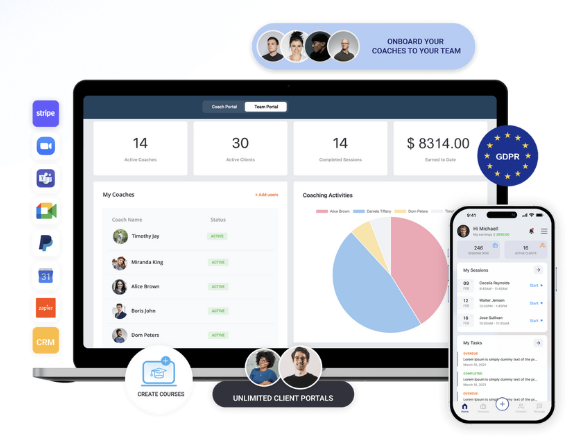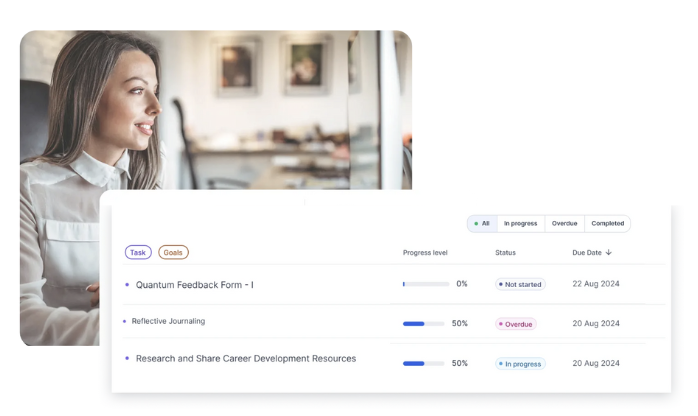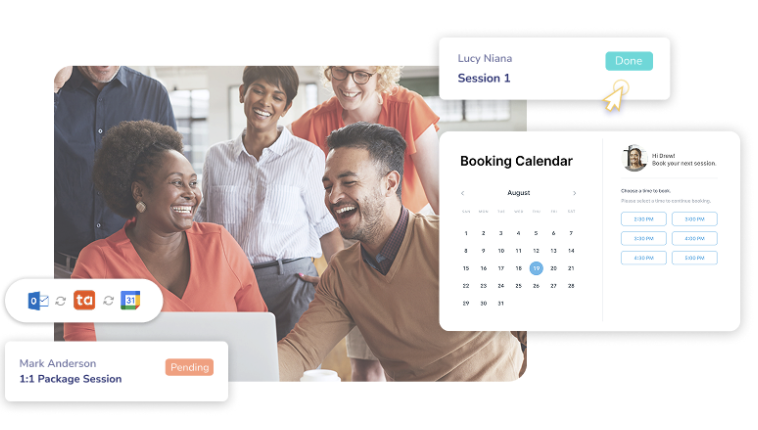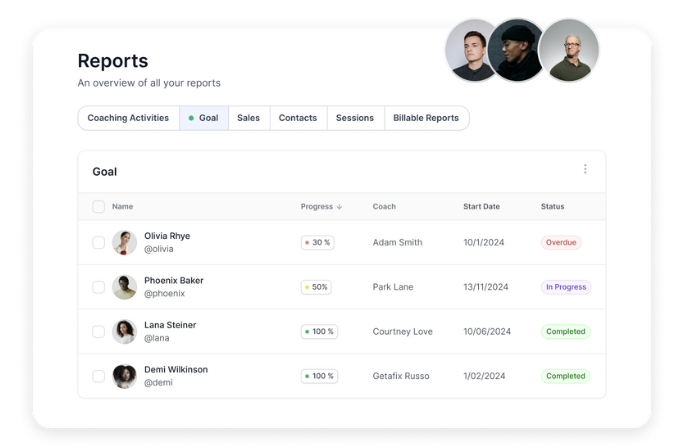Welcome to Delenta’s Best Practice Guide for Hiring and Retaining Top Executive Coaches, a roadmap crafted from the collective wisdom of thousands of coaching companies thriving within our global community.
As a leading coaching management platform provider, we’ve witnessed firsthand how successful coaching firms build high-impact programs by attracting and nurturing exceptional talent. Drawing on the experiences of our diverse community spanning corporate leadership development, team transformation, and individual growth initiatives. This guide distills proven strategies to help you hire coaches who deliver results and keep them engaged for the long haul. Whether you’re scaling a boutique firm or serving Fortune 500 clients, these insights will empower you to create a coaching culture that drives client success and fuels your business growth.
We will delve into seven critical stages, each building upon the last, to ensure you not only attract the most skilled and aligned professionals but also cultivate an environment where they feel valued, grow continually, and choose to make your firm their long-term home. From the initial clarity of defining your needs to fostering a culture of continuous improvement, every step is geared towards a singular objective: building a formidable team of executive coaches who are deeply committed to their craft, your clients, and your shared vision.
.jpg)
The heart of any successful coaching program lies in its purpose. Without a clear vision of what you aim to achieve, you risk hiring coaches who are skilled but misaligned with your goals. Start by asking: What specific outcomes are we targeting? Are you looking to accelerate leadership development, improve team dynamics, navigate organizational change, or boost individual performance under pressure? Each goal demands distinct coaching approaches and expertise.
This foundational step is not merely an administrative checkbox; it's a strategic imperative that directly impacts your ability to attract, empower, and retain the elite coaches who will drive your company's reputation and success.
1.1 Define What You Truly Want to Achieve (Beyond "Growth"):
As a coaching firm, our "achievement" is our clients' success. But this needs to be disaggregated. What specific outcomes are your corporate clients seeking?

1.2 Identify Precisely Who Will Be Coached (and Their Context):
"Executives" is too broad. The challenges and development needs of a newly promoted Director differ vastly from a seasoned CEO navigating a hostile takeover, or a cross-functional leadership team grappling with a global initiative.

1.3 List the Non-Negotiable Skills, Experience, and Qualities Your Ideal Coach Must Possess (The "Gold Standard"):
This is where you define your firm's "gold standard" for coaching excellence. Beyond certifications (which are a given for top-tier firms), what truly differentiates a good coach from an extraordinary one in your ecosystem?

Once your coaching needs are crystal clear, the next frontier is attracting the kind of executive coaches who don't just meet a job description, but actively embody your firm's commitment to excellence. This isn't about passive recruitment; it's about proactive engagement and strategic positioning.
.jpg)
2.1 Cultivate a Premium Pipeline: Referrals, Networks, and Elite Organizations
Forget the shotgun approach of generic job postings. Top-tier executive coaches are rarely looking on public job boards; they're found within trusted networks.

2.2 Articulate Your Purpose: Mission, Values, and Unique Firm Culture
The best coaches aren't just looking for assignments; they're seeking alignment and impact. Your company's mission and values are your most potent attraction tool.

2.3 Champion True Diversity in Your Candidate Pool
In executive coaching, diversity isn't just a buzzword; it's a strategic imperative. A diverse coaching bench provides richer perspectives, enhances client resonance, and ensures your firm can serve a broader range of needs effectively.
Actionable Insight for Your Firm: Set measurable goals for increasing diversity within your coach pipeline. Actively partner with organizations that promote diversity in leadership or coaching. Ensure your language in all outreach materials is inclusive and welcoming.
With a robust pipeline of exceptional talent, the critical next phase is the meticulous selection process. This isn't just about vetting qualifications; it's about identifying individuals who are not only master practitioners but also seamless extensions of your firm's brand and values.
.jpg)
Here’s a focused, industry-specific guide to selecting top coaches.
3.1 Scrutinize Background and Experience
Beyond the CV
While certifications are table stakes, the depth of a coach's background reveals their true capabilities and suitability for your firm's clientele.

3.2 Assess Coaching Style and Philosophical Approach
The Chemistry & Fit Test
A coach's style determines both their effectiveness and their ability to integrate seamlessly into your firm's client engagements. This is where the 'art' of selection truly comes into play.

3.3 Conduct Rigorous Reference Checks
Verifying Reputation and Results
In the executive coaching world, reputation is paramount. Diligent reference checks are non-negotiable for validating a candidate's claims and uncovering invaluable insights.

Securing top-tier coaches is a monumental achievement, but the journey doesn't end there. The onboarding and integration phase is arguably the most critical for ensuring their long-term satisfaction, productivity, and seamless alignment with your firm's operational rhythm and client delivery standards. This is where you transform a new hire into a fully integrated, high-performing member of your coaching family.
.jpg)
Ambiguity is the enemy of excellence. For every client engagement, your coaches need a meticulously crafted roadmap.

Your coaches are external representatives of your brand. Integrating them into your internal ecosystem fosters a sense of belonging and ensures they understand your firm's unique operating principles.

Even the most seasoned coaches need a robust support system to thrive within a new organization. Your commitment to their success should be evident through readily available resources.


The Continuous Pursuit of Excellence
Attracting, selecting, and onboarding top coaches is just the beginning. The true measure of an executive coaching company's impact lies in its ability to consistently deliver tangible results and foster a culture of continuous improvement. This final stage is about embedding a framework that ensures every engagement is set up for maximum success, and every coach is empowered to reach their full potential.
"Success" in executive coaching can be elusive if not precisely defined. For your firm, this means moving beyond anecdotal feedback to quantifiable outcomes.

Consistent communication and feedback are the lifeblood of effective coaching relationships and operational excellence. This applies to both the client engagement and the coach's ongoing performance.


The world of executive leadership is constantly evolving, and so too must your coaches. Your firm's commitment to their continuous growth is key to retention and maintaining your competitive edge.


You've invested heavily in attracting, selecting, and integrating the best executive coaches. The final, and arguably most crucial, piece of the puzzle is ensuring they stay with your firm, actively contributing their brilliance. In a competitive market, retaining top-tier coaches isn't about golden handcuffs; it's about building an environment where they feel valued, supported, and continuously engaged.
These aren't "nice-to-haves"; they are the non-negotiable bedrock of a long-term, positive relationship with your coaches.

Top coaches are intrinsically motivated by growth. Providing pathways for their ongoing development and offering stimulating work are powerful retention tools.


While coaches often work independently, the human need for connection and belonging is powerful. A strong internal community combats isolation and fosters loyalty.


Cultivating a Culture of Continuous Improvement for Lasting Impact
In the dynamic landscape of executive development, stagnation is regression. The most successful executive coaching firms understand that the journey to excellence is iterative and unending. The final, critical step in hiring and retaining top-tier coaches, and ensuring sustained client satisfaction, is embedding a robust framework for continuous improvement across all facets of your operations.
Feedback is the lifeblood of improvement. It provides invaluable insights from the direct beneficiaries and providers of your service.

Feedback is only valuable if it leads to action. A committed approach to process refinement is key to operational excellence and client satisfaction.


A culture of continuous improvement thrives on both positive reinforcement and courageous problem-solving.


How Investing in Your Coaches Fuels Your Firm's Success
Building and sustaining a thriving executive coaching firm isn't merely about finding clients; it's fundamentally about cultivating and cherishing the exceptional talent who deliver your core service. We've walked through the essential stages, each a critical building block in creating a coaching powerhouse.
It all begins with radical clarity: precisely defining your coaching needs – who you're coaching, what outcomes you seek, and the specific expertise required. This foundational step is your compass for all subsequent actions.
Once clear, you then strategically attract the right coaches, moving beyond generic recruitment to leverage referrals, cultivate strong networks, and articulate your firm's unique mission and values. Remember, top coaches are drawn to purpose and a supportive culture, not just assignments. Critically, you must also champion a diverse talent pool to enrich your offerings.
The selection process is where art meets science. It's about meticulously vetting backgrounds, assessing coaching styles for optimal fit, and conducting rigorous reference checks to ensure you bring in not just competent coaches, but true partners who embody your firm's standards.
Once chosen, the onboarding and integration phase is paramount. This means setting clear expectations for every engagement, seamlessly introducing coaches to your company culture and key contacts, and providing all the necessary resources and unwavering support they need to hit the ground running.
Setting up for success is an ongoing commitment. This involves defining measurable success metrics for each client engagement, creating robust feedback loops—both internal and external—and relentlessly encouraging coaches to pursue continuous learning and development.
Finally, keeping your coaches happy is the ultimate retention strategy. This hinges on building a deeply supportive and transparent environment, offering competitive compensation, celebrating their achievements, and actively fostering a vibrant community where they feel valued, connected, and empowered to grow.
The undeniable truth is… Happy, well-supported, and continuously developing coaches are the bedrock of your business success. When your coaches feel respected, empowered, and part of a meaningful mission, they deliver their best work. This translates directly into exceptional client outcomes, stronger client relationships, invaluable referrals, and ultimately, a more reputable and profitable coaching firm. Invest in your coaches, and they will, in turn, invest wholeheartedly in your clients and your vision. It's a virtuous cycle that drives sustained excellence in the demanding world of executive coaching.
Delenta is purpose-built to help you nurture this cycle. From centralizing coach activity and performance tracking to simplifying client management and supporting ongoing professional development, Delenta is the all-in-one coaching platform designed with coaching businesses in mind.
Ready to elevate your coaching operations and empower your team like never before?
👉 Book a free demo with Delenta and see how we can help you drive lasting impact for your coaches, your clients, and your business.